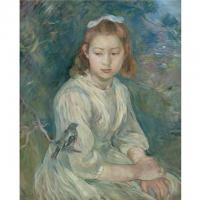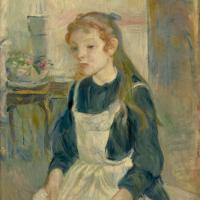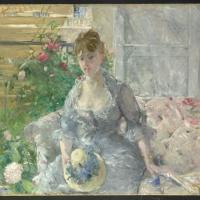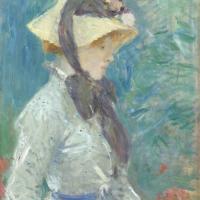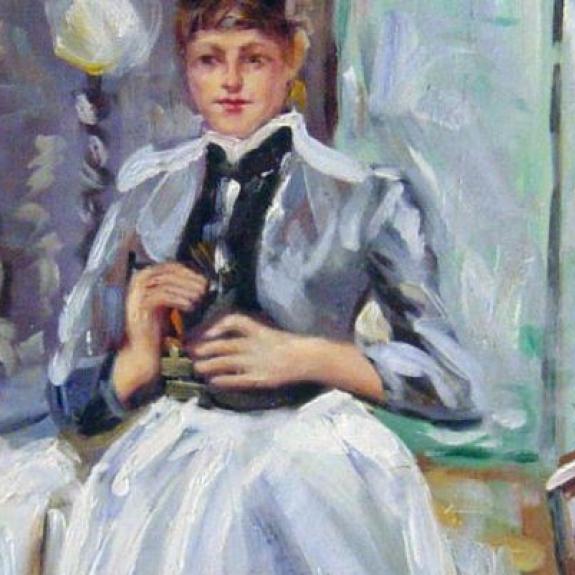Berthe Morisot
Young Girl With A Bird
$480.00
Young Girl With An Apron
$480.00
Young Woman Seated On A Sofa
$450.00
Young Woman With A Straw Hat
$480.00
Berthe Morisot
Berthe Morisot (1841-1895)
Berthe Marie Pauline Morisot (January 14, 1841 – March 2, 1895) was a painter and a member of the circle of painters in Paris who became known as the Impressionists. She was described by Gustave Geffroy in 1894 as one of "les trois grandes dames" of Impressionism alongside Marie Bracquemond and Mary Cassatt.
In 1864, Morisot exhibited for the first time in the highly esteemed Salon de Paris. Sponsored by the government and judged by Academicians, the Salon was the official, annual exhibition of the Académie des beaux-arts in Paris. Her work was selected for exhibition in six subsequent Salons until, in 1874, she joined the "rejected" Impressionists in the first of their own exhibitions, which included Paul Cézanne, Edgar Degas, Claude Monet, Camille Pissarro, Pierre-Auguste Renoir and Alfred Sisley. It was held at the studio of the photographerNadar.
Morisot was married to Eugène Manet, the brother of her friend and colleague Édouard Manet.
Morisot's paintings are commented as full of "feminine charm", which features elegance and lightness. Her brushstrokes are as light as the touch of a petal; therefore, French critics often use the verb "effleurer" (to touch lightly, brush against) to describe her technique. In her early life, Morisot painted in open air as other Impressionists to look for truths in observation. Around 1880 she began painting on unprimed canvases—a technique Manet and Eva Gonzalès also experimented with at the time—and her brushwork became looser. In 1888–89, her brushstrokes transitioned from short, rapid strokes to long, sinuous ones that define form. The outer edges of her paintings were often left unfinished, allowing the canvas to show through and increasing the sense of spontaneity. After 1885, she worked mostly from preliminary drawings before beginning her oil paintings. She also worked in oil paint, watercolors, and pastel simultaneously, and sketched using various drawing media. Morisot's works are almost always small in scale.
Morisot creates a sense of space and depth through the use of color. Although her color palette was somehow limited, her fellow impressionists regarded her as a "virtuoso colorist". She typically made expansive use of white to create a sense of transparency, whether used as a pure white or mixed with other colors. In her large painting, The Cherry Tree, colors are more vivid but are still used to emphasize form.
Furthermore, it is no wonder that the style and techniques that Morisot applied were greatly inspired by her Impressionist friends. Inspired by Manet's drawings, she kept the use of color to the minimum when constructing a motif. Responding to the experiments conducted by Édouard Manet and Edgar Degas, Morisot used barely tinted whites to harmonize the paintings. Like Degas, she played with three media simultaneously in one painting: watercolor, pastel, and oil paints. In the second half of her career, she learned from Renoir by mimicking his motifs. She also shared an interest in keeping a balance between the density of figures and the atmospheric traits of light with Renoir in her later works.
Morisot painted what she experienced on a daily basis. Most of her paintings include domestic scenes about family, children, ladies, and flowers, depicting what women's life was like in the late nineteenth century. Instead of portraying the public space and the society, Morisot preferred private, intimate scenes. It somehow reflects the cultural restrictions of her class and gender at that time. Like her fellow Impressionist Mary Cassatt, she focused on domestic life and portraits in which she could use family and personal friends as models, including her daughter Julie and sister Edma. The stenographic presentation of her daily life conveys a strong hope to stop the fleeting passage of time. By portraying flowers, she used metaphors to celebrate womanhood. Prior to the 1860s, Morisot painted subjects in line with the Barbizon school before turning to scenes of contemporary femininity. Paintings like The Cradle (1872), in which she depicted current trends for nursery furniture, reflect her sensitivity to fashion and advertising, both of which would have been apparent to her female audience. Her works also include landscapes, garden settings, boating scenes, and theme of boredom or ennui. Later in her career Morisot worked with more ambitious themes, such as nudes. In her late works, she often referred to the past to recall the memory of her earlier life and youth, and her departed companions.
Morisot's first appearance in the Salon de Paris came at the age of twenty-three in 1864, with the acceptance of two landscape paintings. She continued to show regularly in the Salon, to generally favorable reviews, until 1873, the year before the first Impressionist exhibition. She exhibited with the Impressionists from 1874 onwards, only missing the exhibition in 1878 when her daughter was born.
Impressionism's alleged attachment to brilliant color, sensual surface effects, and fleeting sensory perceptions led a number of critics to assert in retrospect that this style, once primarily the battlefield of insouciant, combative males, was inherently feminine and best suited to women's weaker temperaments, lesser intellectual capabilities, and greater sensibility.
During Morisot's 1874 exhibition with the Impressionists, such as Monet and Manet, Le Figaro critic Albert Wolff noted that the Impressionists consisted of "five or six lunatics of which one is a woman...[whose] feminine grace is maintained amid the outpourings of a delirious mind."
Morisot's mature career began in 1872. She found an audience for her work with Durand-Ruel, the private dealer, who bought twenty-two paintings. In 1877, she was described by the critic for Le Temps as the "one real Impressionist in this group." She chose to exhibit under her full maiden name instead of using a pseudonym or her married name. As her skill and style improved, many began to rethink their opinion toward Morisot. In the 1880 exhibition, many reviews judged Morisot among the best, even including Le Figaro critic Albert Wolff.
Morisot's work sold comparatively well. She achieved the two highest prices at a Hôtel Drouot auction in 1875, the Interior (Young Woman with Mirror) sold for 480 francs, and her pastel On the Lawn sold for 320 francs. Her works averaged 250 francs, the best relative prices at the auction.
In February 2013, Morisot became the highest priced female artist, when After Lunch (1881), a portrait of a young redhead in a straw hat and purple dress, sold for $10.9 million at a Christie's auction. The painting achieved roughly three times its upper estimate, exceeding the $10.7 million for a sculpture by Louise Bourgeois in 2012.
She was portrayed by actress Marine Delterme in a 2012 French biographical TV film directed by Caroline Champetier. The character of Beatrice de Clerval in Elizabeth Kostova's The Swan Thieves is largely based on Morisot.
She was featured as the "A First Impressionist" in an article written by Anne Truitt in the New York Times on June 3, 1990.
From Melissa Burdick Harmon, an editor at Biography magazine, "While some of Morisot's work may seem to us today like sweet depictions of babies in cradles, at the time these images were considered extremely intimate, as objects related to infants belonged exclusively to the world of women."


